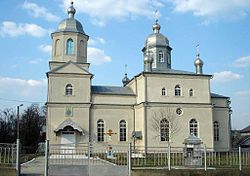Briceni
Briceni | |
|---|---|
 | |
| Country | |
| district | Briceni District |
| Area | |
• Total | 10 km2 (4 sq mi) |
| Population (2012) | |
• Total | 9,900 |
| • Density | 990/km2 (2,600/sq mi) |
| Time zone | UTC+2 (EET) |
| • Summer (DST) | UTC+3 (EEST) |
Briceni (Romanian pronunciation: [briˈt͡ʃenʲ]; Yiddish: Brichon, Russian: Brichany [Бричаны]) is a city in northern Moldova. It is the seat of Briceni District.
At the 2004 census, the city had a population of 8,765. At the 1930 census, there were two localities: Briceni Târg (literally Briceni Fair), and Briceni Sat (literally Briceni village), and at the time they were part of Plasa Briceni of Hotin County.
| Ethnic composition | |||
| Ethnic group | 1930 census | 2004 census | |
| Briceni Târg | Briceni Sat | ||
| Moldovans (Romanians) | 57 | 153 | 3,411 |
| Jews | 5,354 | 63 | 52 |
| Ruthenians (Ukrainians) | 144 | 2,773 | 4,271 |
| Russians | 52 | 98 | 737 |
| Gypsies | – | – | 185 |
| Bulgarians | 1 | – | 26 |
| Gagauzians | – | – | 14 |
| Poles | 10 | 64 | 3 |
| Germans | 2 | 8 | 66 |
| Greeks | 5 | – | |
| Hungarians | – | 1 | |
| others | – | – | |
| Total | 5,625 | 3,160 | 8,765 |
| Native language | |||
| Language | 1930 census | 2004 census | |
| Briceni Târg | Briceni Sat | ||
| Romanian | 64 | 123 | N/A |
| Yiddish | 5,348 | 63 | N/A |
| Ukrainian | 123 | 2,790 | N/A |
| Russian | 83 | 162 | N/A |
| Polish | – | 16 | N/A |
| German | 6 | 6 | N/A |
| Bulgarian | 1 | – | N/A |
| others | – | – | N/A |
| Total | 5,625 | 3,160 | 8,765 |
The town has been also called: Berchan, Bricheni, Bricheni Târg, Bricheni Sat, Britchan, Britchani, Britsiteni.
A village, approximately 30 miles (50 km) to the east to the city, is also known as Briceni. It is at 48° 22´ north latitude and 27° 42´ east longitude, which puts that town 108 miles (174 km) north northwest of Chişinău.
Jewish timeline

| 1817 | The town (then a fair) had 137 Jewish families. Another 47 had previously left when the village was partly destroyed by fire. |
| 1847 | Jewish school opened. |
| 1850 | Briceni had one of the largest Jewish communities in Bessarabia. |
| 1885 | Jewish hospital founded. |
| 1897 | There were 7,184 Jews in Bricheni (96.5% of the total population) |
| 1898 | The town had 7,303 Jews out of a total population of 8,094. There were 972 Jewish artisans, most of whom were furriers who produced and exported up to 25,000 fur overcoats and caps per year. 25 families were dedicated to gardening and to producing tobacco. About 700 Jews were day laborers, earning 10–30 kopeck per day. |
| 1924 | 125 Jews were occupied in agriculture on 64 km² (approx. 1,600 acres) of land, most of it (5 km²) held on lease.[dubious – discuss][citation needed] |
| 1930 | 5354 Jews (95.2% of the total population). There was a Hebrew Tarbut school. |
| 1940 | Jewish population grew to about 10,000.[dubious – discuss][citation needed] |
| June, 1940 | Briceni, along with the rest of Bessarabia was occupied by the USSR. Most Jewish property and community buildings were confiscated. The only synagogue was saved because the Soviets decided to use it as a granary. About 80 Jews, mostly community leaders, were exiled to Siberia. |
| July 8, 1941 | German & Romanian troops passed through the town, murdering many Jews. Jews from the neighboring towns of Lipcani (then Lipcani Târg) and Sokyriany (then Secureni Târg) were brought to Briceni. |
| July 28, 1941 | All Jews were dispatched across the river Dniester (outside Bessarabia) and several were shot en route. When they arrived in Mohyliv-Podilskyi, the Germans "selected" the old people and forced the younger ones to dig graves for them. From Mohyliv-Podilskyi the rest were turned back to Otaci and then on to Secureni-Târg. Hundreds died en route. For a month they stayed in the ghetto there, only to be deported again to Transnistria in late 1941. All the young Jews were murdered in a forest near Soroca. |
| After 1945 | Only about 1,000 Jews returned to Briceni at the end of the World War II. |
The Jewish cemetery of Briceni, containing some 2,500 tombstones, is heavily overgrown, but generally preserved. It is located in the eastern vicinities of the town, left of the road R11 leading to Ocnița.
Media
- Radio Chişinău 102,6 FM
International relations
Twin Towns – Sister Cities
Briceni is twinned with:
 Rădăuţi, Romania
Rădăuţi, Romania


